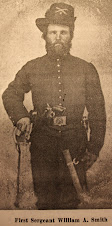The Myth goes something like this.
In 1862 Union Army Captain Robert Ellicombe was near Harrison’s Landing in Virginia. During the night through the sounds of battle, Captain Ellicombe heard the cries of a wounded soldier. Not knowing if the soldier was Union or Confederate, Captain Ellicombe decided to risk his own life and gather up the soldier and bring him into camp for medical care. The Captain crawled onto the battlefield with bullets flying and pulled the soldier to safety. In the dark, he could only make out that the young mans uniform was Confederate. Captain Ellicombe lit a lantern and placed it near the soldier and discovered it was his own son. His son was a music student in the South when the war began and without consulting his father, he joined the Confederate forces. Captain Ellicombe asked his superiors if he could give his son a full military burial and was granted a portion of his request. He was not allowed to use a full military band, but was told he could have one musician. The Captain selected a bugler. Captain Ellicombe recovered a piece of paper with music notes on it in his son pocket. Realizing his son must have written it, he requested the bugler play it as they laid his son to rest. This haunting melody we now know as “Taps” is used at military funerals.
The Truth [An Excerpt From Twenty-Four Notes That Tap Deep Emotions: The story of America's most famous bugle call by Jari Villanueva]
Taps began as a revision to the signal for Extinguish Lights (Lights Out) at the end of the day. Up until the Civil War, the infantry call for Extinguish Lights was the one set down in Silas Casey's (1801-1882) Tactics, which had been borrowed from the French. The music for Taps was adapted by Union General Daniel Butterfield for his brigade (Third Brigade, First Division, Fifth Army Corps, Army of the Potomac) in July, 1862. As the story goes, General Butterfield was not pleased with the call for Extinguish Lights, feeling that the call was too formal to signal the days end, and with the help of the brigade bugler, Oliver Willcox Norton (1839-1920), wrote Taps to honor his men while in camp at Harrison’s Landing, Virginia, following the Seven Days battle. These battles took place during the Peninsular Campaign of 1862. The new call sounded that night in July, 1862, soon spread to other units of the Union Army and was reportedly also used by the Confederates. Taps was made an official bugle call after the war.
The first time I heard Taps, I was 9 years old and we were burying my father at Fort Sam Houston Cemetery in San Antonio. Myth or Truth, this song touches the soul.
Sunday, January 18, 2009
Saturday, January 3, 2009
Buglers in the Civil War
These heroic men, Union or Confederate were in large part the foundation of any camp during the Civil War. They would provide entertainment, alarm services for duties, and relayed calls during battle. Buglers were generally associated with cavalry and artillery, while drums were with the infantry.
Gustav Shurmann known as "The Little Bugler" rode with several commanders, one was Daniel Sickles…which if you have followed my blog, you know I have a fascination for this man.
Gustav was only 12 years old when he started riding in the war. Buglers would ride alongside the commanders in battle, it was thought since the sound of the bugle carried so well…it was the best source of organization during battle. During the heat of battle, you could still hear the bugles play above the cannons and guns.
The letters from Union Sergeant William A. Smith, mention the buglers regularly. After reading the letters, I felt the buglers were the glue holding the men together and helped them get through each day whether battle or at rest.
Smith's Letter dated February 15th, 1862 with location Cape Girardeau, Missouri
My Dear Wife
I once more take my pen to address you a few lines to let you know that I am still on times side of Eternity, enjoying good health and I believe a reasonable mind, hoping you and the children are in good health.
…A man cannot die in a better cause….The Captain goes to Cairo by the first boat, to get our carbines….
(and he ends his letter) …The bugle is sounding 8 o’clock roll call, so good night.
Gustav Shurmann known as "The Little Bugler" rode with several commanders, one was Daniel Sickles…which if you have followed my blog, you know I have a fascination for this man.
Gustav was only 12 years old when he started riding in the war. Buglers would ride alongside the commanders in battle, it was thought since the sound of the bugle carried so well…it was the best source of organization during battle. During the heat of battle, you could still hear the bugles play above the cannons and guns.
The letters from Union Sergeant William A. Smith, mention the buglers regularly. After reading the letters, I felt the buglers were the glue holding the men together and helped them get through each day whether battle or at rest.
Smith's Letter dated February 15th, 1862 with location Cape Girardeau, Missouri
My Dear Wife
I once more take my pen to address you a few lines to let you know that I am still on times side of Eternity, enjoying good health and I believe a reasonable mind, hoping you and the children are in good health.
…A man cannot die in a better cause….The Captain goes to Cairo by the first boat, to get our carbines….
(and he ends his letter) …The bugle is sounding 8 o’clock roll call, so good night.
Subscribe to:
Posts (Atom)
